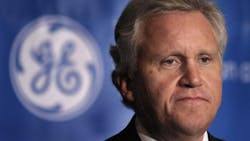General Electric expects firm growth in its global industrial business in 2016, despite economic turmoil and the deep oil sector contraction.
GE said its sweeping restructuring, including the spinoff of its Synchrony banking arm and sale of GE Appliances, and the acquisition of the power generation arm of France’s Alstom, have left it well-poised for the coming year with a $315 billion backlog of orders.
The industrial giant turned in a $6.1 billion loss for 2015 mainly due to the costs of restructuring. GE’s fourth quarter though came in with a firm 22.3% gain in net earnings at $6.3 billion.
CEO Jeffrey Immelt said “organic” or core business growth was solid last year and that the company continues to make headway despite the turmoil in global financial markets and the slowdown, especially in emerging-market economies like China, where GE is strong.
“GE executed well in a slow-growth environment,” Immelt said. “We recognize that the first few weeks of 2016 have been especially volatile. However, our orders in the fourth quarter grew one% organically and our backlog grew to $315 billion with Alstom. We believe in the strength of our business model and that there is enough growth out there to deliver in 2016.”
A roughly 1% fall in sales over the year, to $105.8 billion, and a similar decline in the fourth quarter showed the challenge in what Immelt called “a slow-growth and volatile economy.”
The company saw its oil and gas sector business decline last year as the collapse in oil prices forced cutbacks in exploration and production.
“Clearly oil pricing is a concern and will have an impact,” Immelt told analysts in a conference call.
Confidence in China
Even so, he said, businesses like aviation and power generation remain strong, with buyers taking the long-term view. After the fourth quarter saw a slight increase in orders, he said, “There is still enough business out there to hit our goals.”
GE is most of the way through a restructuring to hone its focus on its key traditional industrial businesses, which also include railway equipment and renewable energy like wind turbines, and to grow in newer sectors like health care and energy management.
It also announced last week that it would move from its longstanding home base in Fairfield, Conn., to Boston, in part to take advantage of Boston’s stronger science and technology environment.
Citing better margins, the company beat earnings per share forecasts for continuing operations for both the quarter and the year: 52 cents in the quarter, up 27% and three cents above expectations; and $1.31 for the year, up 17% and two cents more than expected.
Nevertheless, the company disappointed slightly on sales and revenues, and that helped push its shares down 2.0% to $28.02 in early trade Friday, even as the overall stock market gained. Immelt expressed cautious optimism for the coming year, sticking to GE’s forecast of 2-4% organic growth.
Revenues and profits in the fourth quarter were strong in its aviation division, where it provides aircraft engines and other equipment. Transportation — mainly railway equipment — was also solid. But its power generation, renewable energy and oil and gas divisions all sagged.
Immelt said that in the key China market, the overall economic slowdown was not expected to hurt its main businesses. The acquisition of Alstom brought an increase in its power sector order book in China. “Aviation remains super strong” in China, he added.
He said that after two months, the takeover of Alstom is going well despite its complexities. The merger had a neutral impact on earnings, and boosted GE’s overall order book.
“On balance we like what we see in Alstom,” Immelt said, “We think our synergies are achievable.”
As for the oil and gas sector, the company stressed that about 80% of its business is in longer-term projects less affected by the crash in oil prices, at least so far. Exploration, the hardest-hit part of the industry, accounts for only a small part of GE’s business.
Immelt said the company’s global presence helps it balance through financial turmoil, currency devaluations and regional slumps.
“We believe we can deliver strong performance in the face of volatility,” he said.
Copyright Agence France-Presse, 2016
About the Author
Agence France-Presse
Copyright Agence France-Presse, 2002-2025. AFP text, photos, graphics and logos shall not be reproduced, published, broadcast, rewritten for broadcast or publication or redistributed directly or indirectly in any medium. AFP shall not be held liable for any delays, inaccuracies, errors or omissions in any AFP content, or for any actions taken in consequence.
